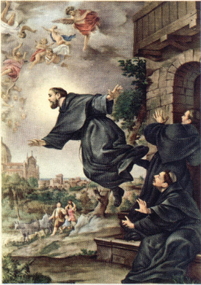
The chief outcome of this love of God was the strong and marvellous trances whereinto he oftentimes fell. It was, nevertheless, strange to observe that after he had entirely lost his senses he could be called out the trance by the mere order of his superiors. To be utterly obedient was one of his chief aims, and he was used to say that those who ruled him could lead him about like a blind man, and that it was better to die than not to obey. He so imitated the poverty of the Seraphic Patriarch, that when he was at the point of death, when the Friars use to dispose of anything they have, he was able to tell his Superior that he had absolutely nothing. Thus bearing about in his body the dying of the Lord Jesus, the life also of Jesus was made manifest in his body. When he saw that certain persons had committed a foul sin of uncleanness, there came from him a strong savour, a proof of that snowy and glorious purity which, in spite of the most hideous temptations whereby the unclean spirit wrestled long to darken it, he kept undefiled, partly by an iron bridling of his senses, partly by the stern punishments he inflicted upon his own body, and partly by the extraordinary protection of the pure Virgin Mary, whom he was used to call his own Mother, whom he honoured and worshipped as his most tender Mother in his very heart of hearts, and whom he was eager that all men should honour, because, as he said, if we have her protection, every good thing cometh with it.
This eagerness on the part of the blessed Joseph was but one outcome from his love for his neighbours. So great was his zeal for souls, that he vehemently sought in all ways for the salvation of all. When he saw his neighbour in any trouble, whether it were poverty or sickness or any other affliction, his tenderness went out toward him, and he helped him as well as he could. They who reviled, and slandered, and insulted himself were not cut off from his love. He was used to welcome such with great long-suffering, meekness, and cheerfulness of countenance; and he preserved the same constantly amid many hardships and changes when he was sent hither and thither by command of the Superiors of his Order, and of the Holy Inquisition. People and princes alike marvelled at the exceeding holiness of his life, and the spiritual gifts poured upon him from above, but he was so lowly, that he sincerely held himself to be chief among sinners, and earnestly besought God to take away from him the more showy of his gifts. Of men he entreated that after his death they would cast his body somewhere where his memory might soonest perish. But God, who exalteth them of low degree, glorified his servant during life with the gifts of heavenly wisdom, of prophecy, of discerning the hidden thoughts of the heart, of healing, and of other spiritual gifts in marvellous abundance, gave him a precious death, and made the place of his rest glorious. He fell asleep in Jesus upon the very day and at the very place foretold by himself, that is, at Osimo, in the 61st year of his own age. He was famous for miracles even after his death, and Benedict XIV enrolled his name among those of the Blessed, and Clement XIII among those of the Saints. Clement XIV, being himself a member of the same Order, extended the use of the Office and Mass in memory of him to the whole Church.





